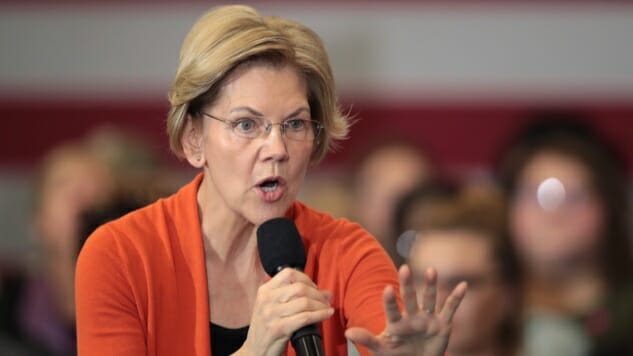In the Democratic Primary, It’s Time to Accept—No, Embrace—the Attacks
Photo by Scott Olson/Getty
This was inevitable, and anyone who thought it wasn’t is crazy. Back in June, when the first Democratic primary debates took place, things were largely peaceful. There were a few snipes and memorable one-liners here and there, but mostly it was about attacking Trump and pushing the line that any Democrat would be better. It was a superficial act of theater, and most people watching knew it. In my estimation, the “winners” of that meaningless debate were Booker, Castro, DeBlasio, Warren. Six months later, three of them are out, and the fourth is staggering to the finish line in Iowa.
The point is, peace and unity are fine six months away from the first caucus, but the corresponding displays are eminently forgettable, and make zero impact on the voting public. Now, here in mid-January, we’re exactly three weeks away from the Iowa caucuses, the race is agonizingly close, and the candidates with a legitimate shot can taste it. It is 100% inevitable, just as it has been in every primary and presidential race in American history, that things are going to get more aggressive. That immutable truth became even more urgent when a new Des Moines Register poll came out showing Bernie Sanders was in the lead, albeit marginally—at that point, you knew the candidate who usually gets the short end of the stick was about to walloped mercilessly for a month straight.
Ironically, the current line of attack, for as long as it lasts, seems be “Bernie’s attacking!” Politico fired the first salvo via a reporter who covers the Warren campaign, writing about a script allegedly used by Team Sanders when knocking on doors. Regarding Warren in particular, here’s the dirt:
The script instructs Sanders volunteers to tell voters leaning toward the Massachusetts senator that the “people who support her are highly-educated, more affluent people who are going to show up and vote Democratic no matter what” and that “she’s bringing no new bases into the Democratic Party.”
“I like Elizabeth Warren. [optional]” the script begins. “In fact, she’s my second choice. But here’s my concern about her.” It then pivots to the criticisms of Warren.
Beyond being true, these “attacks” are incredibly tame even by primary standards, and, of course, impossibly polite compared to what Trump would drudge up in a general election. Interestingly, Warren opted to play up the aggression, and was on hand to scold Bernie for “trashing” her. The video was quickly tweeted out by the same reporter who wrote the story:
Warren hits back: “I was disappointed to hear that Bernie is sending his volunteers out to trash me. Bernie knows me and has known me for a long time…I hope bernie reconsiders and turns his campaign in a different direction.” Also notes the “factionalism” caused by 2016 https://t.co/ER0Vm6sgJSpic.twitter.com/N8prZdeZk9
— Alex Thompson (@AlxThomp) January 12, 2020
Meanwhile, her surrogates went further, with one telling the NYT that it “doesn’t surprise me about Bernie…he went straight to the gutter with Hillary. More of the same.”
NBC News outlines the other recent devastating broadsides by Team Sanders (under the hilarious headline of “Bernie Sanders Goes on the Attack, Reviving Memories of 2016, with the even more hilarious partial byline of ‘Chuck Todd’), including:
On Saturday night — a day after the Des Moines Register poll showed Sanders narrowly leading the Dem race — his campaign blasted Joe Biden’s vote to authorize the Iraq war.